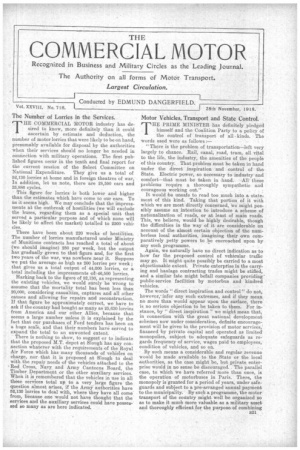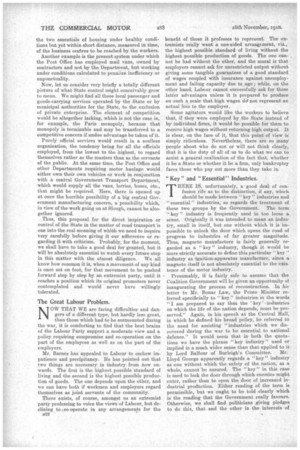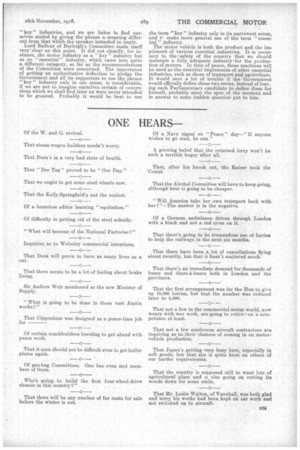The Number of Lorries in the Services.
Page 1

Page 2

Page 3

If you've noticed an error in this article please click here to report it so we can fix it.
THE COMMERCIAL MOTOR industry has desired to know, more definitely than it could ascertain by estimate and deduction, the number of motor lorries that were likely to been hand, presumably available for disposal by the authorities -when their services should no longer be needed in connection with military operations. The first published figures occur in the tenth and final report for the current session of the Select Committee on National Expenditure. They give us a total of 52,130 lorries at home and in foreign theatres of war, In addition, let us note, there are 28,590 cars and 33,886 cycles.
This figure for lorries is both lower and higher than the estimates which have come to our ears. To us it seems high. We may conclude that the impressmeats at the outbreak of hostilities (we will exclude the buses, regarding them as a special unit that served a particular purpose and of which none will be likely to affect the market) totalled to 2500 vehicles.
There have been about 220 weeks of hostilities. The number of lorries manufactured under Ministry of Munitions contracts has reached a total of about (we should imagine) 280 per week, but the output has gradually grown to that figure and, for the first two years of the war, was nowhere near it. Suppose we put the average as high as 200 lorries per week ; that gives us a total output of 44,000 lorries, or a total including the impressments of 46,500 lorries.
Harking back to the figure of 52,130, as representing the existing vehicles, we would surely be wrong to assume that the mortality total has been less than 20,000, considering casualties, captures and all other ca-uses and allowing for repairs and reconstruction. If that figure be approximately correct, we have to ask if the country had bought as many as 25,630 lorries from America and our other Allies, because that seems a large number unless it is explained by the fact that our purchases of Ford tenders has been on a huge scare, and that their numbers have served to expand the total to an unwonted extent.
There is nothing to show, to suggest or to indicate that the proposed M.T. depot at Slough has any connection whatever with the requirements of the Royal Air Force which has many thousands of vehicles on charge, nor that it is proposed at Slough to deal with the repair needs of the vehicles attached to the • Red Cross, Navy and Army Canteens Board, the Timber Department or the other auxiliary services. When it is remembered that the vehicles in use in all these services total up to a very large figure the question almost arises, if the Army authorities have 52,130 lorries to deal with, where they have all come from, because one would not have thought that the services and the auxiliary services could have possessed so many as are here indicated.
Motor Vehicles, Transport and State Control.
THE PRIME MINISTER has definitely pledged himself and the Coalition Party to a policy of the control of transport of all . kinds. The words used were as follows :— "There is the problem of transportation—left very largely to chance. Rail, canal, road, tram, all vital to the life, the industry, the amenities of the people of this country. That problem must be taken in hand under the direct inspiration and control of the State. Electric power, so necessary to industry' and comfort—that must be taken in hand. All these problems require a thoroughly sympathetic and courageous working out."
It would be unsafe to read too much into a statement of this kind. Taking that portion of it with which we are most directly concerned, We might possibly assume an intention to introduce a scheme of nationalization of roads, or at least of main roads. This, we believe, would be. highly desirable, though the difficulties in the way of it are considerable on account of the almost certain objection of the numberless local authorities, imagining their own comparatively petty powers to ,12e encroached upon by any such programme.
Again, we naturally have no direct indication as to how far the proposed control of vehicular traffic may go. It might quite possibly be carried to a most objectionable extent. Private enterprise in the carrying and haulage contracting trades might be stifled, and a similar fate might befall companies providing' public-service facilities by motorbus and kindred vehicles.
The words "direct inspiration and control" do not, however,' infer any such extremes, and if they mean no more than would appear upon the surface, there' is no serious objection to be taken to them. For instance, by "direct inspiration " we might mean that, in connection with the great national development schemes now under consideration, definite encouragement will be given to the provision of motor services,' financed by privatø capital and operated as limited monopolies, subject to adequate safeguards as regards frequency of service, wages paid to employees, condition of vehicles, and so on.
By such means a considerable and regular revenue would be made available to the State or the local authorities, as the case might be, but private enterprise would in no sense be discouraged. The parallel case, to which we have referred more than once, is the operation of motorbuses in Paris. There, the monopoly is granted for a period of years, under safeguards and subject to a pre-arranged annual payment to the municipality. By such a programme, the motor transport of the country might well be organized so as to make it much more valuable as a military asset and thoroughly efficient for the purpose, of combining the two essentials of housing under healthy conditions but yet within short distance, measured in time, of the business centres to be reached by the workers.
Another example is the present system under which the Post, Office has employed mail vans, owned by contractors and not by the Department, but working under conditions calculated to penalize inefficiency or unpunctuality.
Now, let us consider very briefly a totally different picture of what State control might conceivably grow to mean. We might find all these local passenger and goods-carrying services operated by the State or by municipal authorities for the State, to the exclusion of private enterprise. The element of competition would be altogether lacking, which is not the case in, for example, the Paris monopoly, because that monopoly is terminable and may be transferred to a competitive concern if undue advantage be taken of it.
Purely-official services would result in a soulless organization, the tendency being for all the officials employed, from the lowest in the highest, to regard themselves rather as the masters than as the servants of the public. At the same time, the Post Office and other Departments requiring motor haulage would either own. their own vehicles or work in conjunction with a central Government Transport Department, which would supply all the vans, lorries, buses, etc., that might be required. Here, there is opened up at once the horrible possibility of a big central Government manufacturing concern, a-possibility which, in view of the work going on at Slough, cannot be altogether ignored.
Thus, this proposal for the direct inspiration or control of the State in the matter of road transport is one into the real meaning of which we need to inquire very carefully before giving it our adherence or regarding it with criticism. Probably, for the moment, we shall have to take a good deal for granted, but it will be absolutely essential to watch every future step in this matter with the utmost diligence. We all know how oonamon it is, when a movement of any kind is once set on foot, for that movement to be pushed forward step by step by an 'extremist party, until it reaches a position which its original promoters never contemplated and would never have willingly tolerated.
The Great Labour Problem.
NOW THAT WE are facing difficulties and dangers of a different type, but hardly less great, than those which had to be surmounted during the war, it is comforting to find that the best brains of the Labour Party support a moderate view and a policy requiring compromise and co-operation on the part of the employees as well as on the part of the employers. .
Mr. Barnes has appealed to Labour to eschew impatience and precipitancy. He has pointed out that two things are necessary in industry from now onwards. The first is the highest possible standard of living and the second is the highest possible production of goods. The one depends upon the other, and we can have both if workmen and employers regard themselves as joint servants of the community.
There exists, of course, amongst us an extremist party professing to voice the views of Labour, but declining to :co-operate in any arrangements for the n2a benefit of those it professes to represent. The extremists really want a, one-sided arrangement, viz., the highest possible standard of living without the highest possible production of goods. The one can. not be had without the other, and the moral is that employers cannot ask for unrestricted output without giving some tangible guarantees of a good standard of wages coupled with insurance against unemployment and failing capacity due to age ; while, on the other hand, Labour cannot successfully ask for these latter advantages unless it is prepared to produce on such a scale that high wages dd not represent an actual loss to the employer.
Some agitators would like the workers to believe that, if they were employed by the State instead of by individual firms, it would be possible for them to receive high wages without returning high output. It is clear, on the face of it, that this point of view is simply ridiculous. Nevertheless, there are so many people about who do not or will not think clearly, that it is the duty of all of us to do what we can to assist a general realization of the fact that, whether it be a State or whether it be a, firm, only bankruptcy faces those who pay out more than they take in.
" Key " and "Essential" Industries.
HERE IS, unfortunately, a good deal of con fusion rife as to the distinction, if any, which should be made between " key " industries and " essential " industries, as regards the treatment of these two groups by the Government. The term " key " industry is frequently used in tooloose a sense. Originally it was intended to mean an industry, small in itself, but one without which it is impessible to unlock the door which opens the road of progress to industries of far greater magnitude. Thus, magneto manufacture is fairly generally regarded as a " key " industry, though it would be more strictly aocurate to define this particular " key " industry as ignition-apparatus manufacture, since a magneto itself is not absolutely essential to the existence of the motor industry.
Presumably, it is fairly safe to assume that the Coalition Government will be given an opportunity ol inaugurating the process of reconstruction. In. his letter to Mr. Bonar Law, the Prime Minister referred specificially to "key" industries in the words "I am prepared to say that the 'key industries on which the life of the nation depends, must be preserved." Again, in his speech at the Central Hall, in which he defined his broad policy, he referred to the need for assisting "industries which we discovered during the war to be essential to national defence." It would seem that in both the quotations -we have the phrase "key industry" used or implied in a much wider sense than that applied to it by Lord Balfour of Bui-leigh's Committee. Mr. Lloyd George apparently regards a " key " industry as one without which the safety of the nation, as a whole, cannot 'be assured. The " key " in this case is used to lock the door through which enemies might enter, rather than to open the door of increased industrial production. Either reading of the term is permissible, but we ought to be told clearly which is the reading that the Government really favours. Otherwise, we shall find politicians giving pledges to do this, that and the other in the interests of " key " industries, and we are liable to find ourselves misled by giving the phrase a meaning different from that which the speaker intended to imply. Lord Balfour of Burleigh's Committee made itself verysclear on this point. It did not classify, for instance, the motor industry as a " key " industry but as an " essential " industry, which came into quite a. different category, so far as the recommendations of the Committee were concerned. The importance of getting an authoritative definition to pledge the Government and all its supporters to use the phrase " key " industry only in one sense, is considerable, If we are not to imagine ourselves certain of concessions which we shall find later on were never intended to be granted. Probably it would be best to -use the term key" industry only in its narrowest sense, and t, make more general use of the term " essential " „industry. The motor vehicle is both the product and the im. plement of various essential industries. It is necessary to the safety of the country that we should maintain a fully adequate industry 'for the production of motors. In time of peace, these machines will be used as the essential implements of other essential industries, such as those of transport and agriculture. It would save a lot of trouble if the Government would officially define these two terms, instead of leaving each Parliamentary candidate to define them for himself, probably upon the spur of the moment and in answer to some sudden question put to him.






















